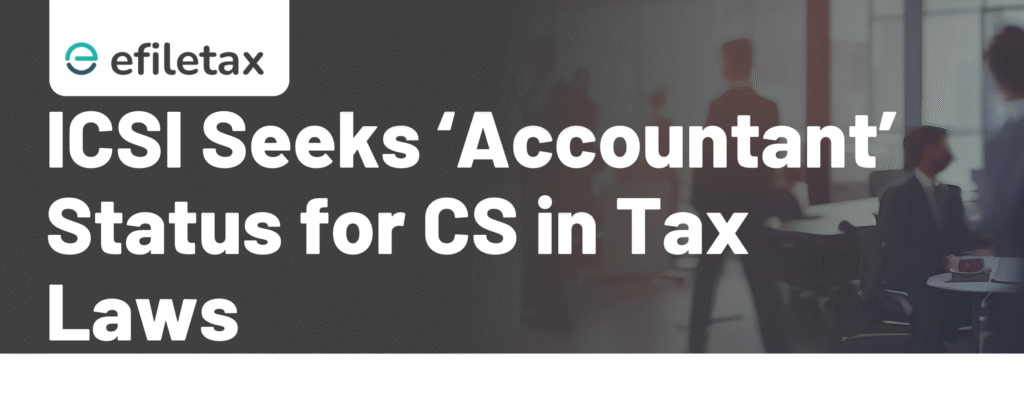
Introduction
The Income Tax Bill has triggered discussions across professional bodies. One key pitch: recognising Company Secretaries as accountants in tax law. The Institute of Company Secretaries of India (ICSI) has formally urged the Finance Ministry to extend the legal status of “accountant” to CS professionals, currently restricted to Chartered Accountants and Cost Accountants.
Why This Matters: The Current Legal Definition of ‘Accountant’
Under Section 288(2) of the Income-tax Act, 1961, the term “accountant” is limited to a Chartered Accountant holding a valid certificate of practice.
This restricts several tax functions—like:
- Representing assesses before tax authorities
- Certifying forms (e.g., Form 10B for trusts)
- Conducting audits and issuing reports under the Income-tax Act
Company Secretaries are excluded, despite their statutory role in compliance and corporate governance.
What ICSI Proposes in the New Income Tax Bill
In its representation on the Income Tax Bill, 2025, ICSI has urged the Finance Ministry to:
- Amend the definition of “accountant” to include Company Secretaries in practice
- Align treatment with other statutes like the Companies Act and FEMA, where CS professionals are recognised for certification and compliance
Official Reference:
This suggestion was submitted as part of ICSI’s memorandum to the Revenue Department and the Parliamentary Committee on Finance.
Key Implications for Indian Taxpayers and Businesses
If accepted, this change will:
| Area | Current Scenario | Post Inclusion of CS |
|---|---|---|
| Certification Rights | Only CA/CMA | CS can also certify in specified cases |
| Representation before ITD | Limited to CAs | CS can appear as authorised reps |
| Ease of Compliance | Limited expert access | Wider professional base for MSMEs |
| Competition | CA/CMA monopoly | Level-playing field among 3 institutes |
Expert View: Why Inclusion Makes Sense
CS professionals are already empowered under SEBI, MCA, and FEMA. Tax law is the only major area where they’re left out, says a senior partner at a mid-sized CS firm.
Given their training in company law, secretarial audit, and compliance, ICSI members are well-positioned to handle tax certification work, especially for companies and LLPs.
Legal & Policy Angle
- Companies Act, 2013: CS are recognised for certification and compliance functions
- FEMA: CS in practice can issue certificates for certain transactions
- SEBI (LODR): Listed companies rely on CS for secretarial compliance reports
- Income Tax Act: Still restrictive — CAs dominate the definition of “accountant”
Hence, ICSI’s call for parity under Income Tax law is both logical and overdue.
Actionable Takeaways
- For Businesses: Wider options if the definition expands—more professionals to certify, represent, and consult
- For CS Professionals: Push for representation rights and certification inclusion
- For Policymakers: Consider harmonising the term “accountant” across Indian statutes
Efiletax View: What This Means for You
At Efiletax, we work with qualified CAs, CS, and CMAs across India.
If the new definition is accepted, our CS partners can offer even more value — especially in filings, certifications, and tax representations for corporates and LLPs.
Stay tuned as we track the final shape of the Income Tax Bill.
FAQ
Q1. What does “accountant” mean in tax law?
Under Section 288(2), it means a Chartered Accountant in practice. CS and CMA are currently excluded.
Q2. Can Company Secretaries certify tax returns or audit forms?
Not under the Income-tax Act. ICSI is pushing for this inclusion in the new Bill.
Q3. Will the change dilute audit quality?
Unlikely. CS professionals are already doing statutory certifications under other laws. This broadens access, especially for small businesses.
Summary
ICSI has urged the government to include Company Secretaries as “accountants” under the Income Tax Bill, 2025. This move seeks parity with CAs and CMAs, enabling CS professionals to certify tax forms and represent clients. A change here can benefit both professionals and taxpayers.